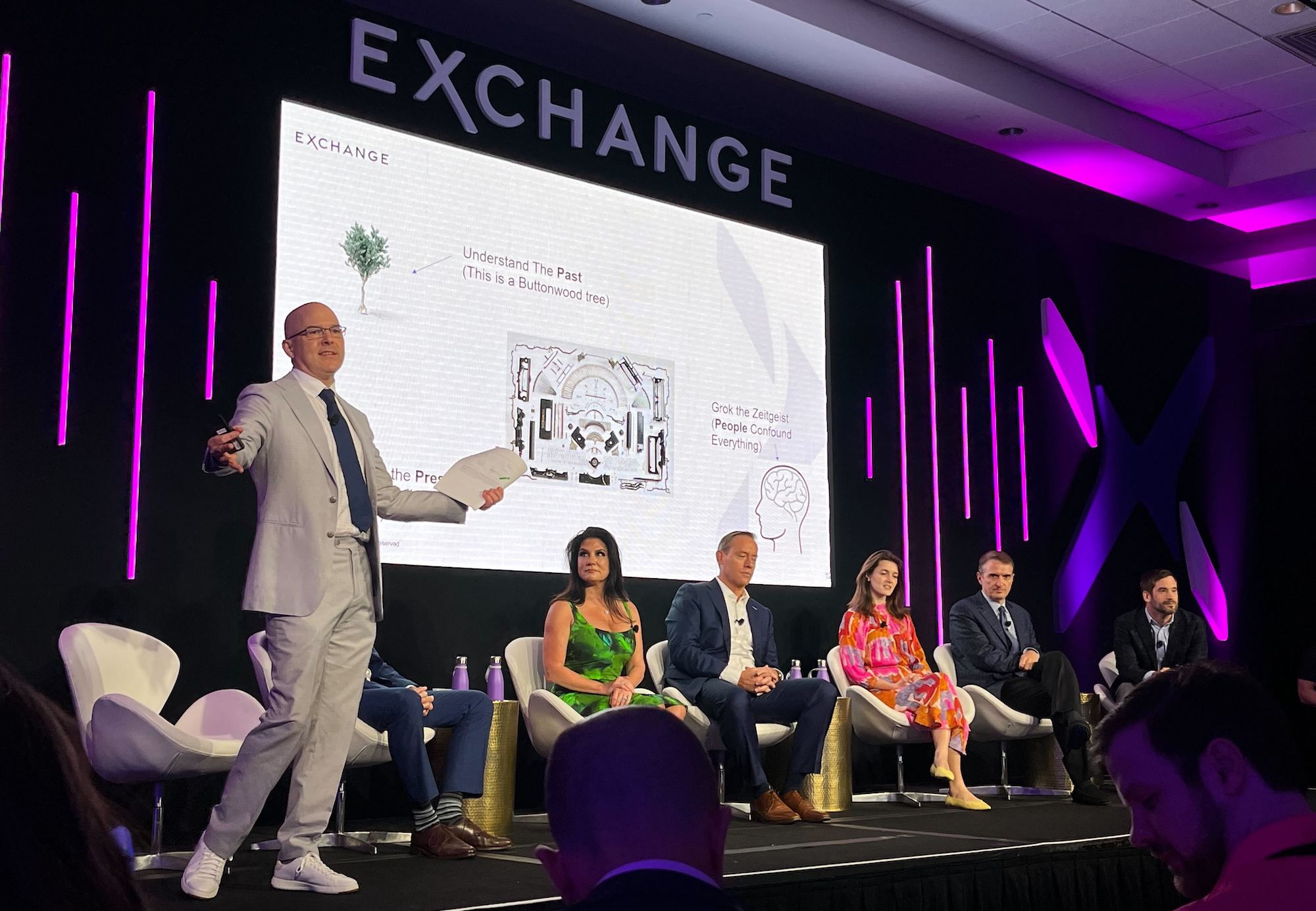With many interconnecting challenges, from climate change to political extremism to hot wars, the world is amid a polycrisis.
During a panel led by VettaFi financial futurist Dave Nadig on Monday at Exchange: An ETF Experience, financial thought leaders discuss how institutions that have historically helped navigate global problems – governments, corporations, universities – are now less trusted by individuals than ever before, as well as how rapid advances in technology are creating disruptions while simultaneously offering solutions.
Panelists Adam Butler, CIO of ReSolve Asset Management, Danielle DiMartino Booth, CEO and chief strategist for Quill Intelligence, and Mike Green, portfolio manager and chief strategist at Simplify, discussed institutional failure and how we’re operating on models that are just no longer correct.
Meanwhile, panelists Georgia Stewart, CEO and co-founder of Tumelo, and Jim Bianco, president and macro strategist at Bianco Research, discussed ways to solve that institutional failure, including democratizing stewardship, decentralized autonomous organizations (DAOs), and crypto.
Tom Morgan, director of communications and content at KCP, offered deep insight into what the hero’s journey can tell us about institutional failure and financial reform.
To conclude the dynamic panel, Nadig asked how each panelist obtains information and determines relevance in their personal and professional lives given the state of the current world.
“I seek out articles and people who are providing opinions or thoughts and frameworks that just don’t make any sense to me, I seek out oppositional ideas,” Butler said. “I’ll go looking for people publishing on that topic on Twitter or SSRN. It’s just constantly challenged my own biases, perceptions, frameworks. I think that helps sharpen my toolkit.”
DiMartino Booth said Twitter has become a very useful tool, and she will follow up to 500 accounts – but filtering the accounts she follows regularly helps to keep the content dynamic and meaningful. If she finds a new resource, she will go through her existing list of accounts she followed to filter out ones that are no longer impactful.
“Something like this [panel]is a great example because I have to step way outside my comfort zone to be up here with most of you — but do that regularly,” DiMartino Booth said.
A Changing Outlook
Green said having children changed his outlook. “I spent the vast majority of my life deeply in the mathematical, the logical, trying to find as much info as you possibly can. It’s only when you start to embrace the human components of what are we trying to accomplish that you truly start thinking about the system from a truly holistic standpoint. I think we all look at behavior we’re seeing from our children and grandchildren – we know we’re on the wrong path,” he said
Stewart said listening to younger people and organizations is essential. “Trying not to shut them down when we think they might be confused,” she added. In addition, Stewart pointed to embracing potential failure.
“I agree with a lot of what has been said, but I’ll throw out the idea of objectivity,” Bianco said. “I’ve learned a couple programming languages, I have people that work for me that know other programming languages, and so when we explore an idea, I like to say, ‘can we get the data together and can we get an answer within an hour or two that gets us to the point of were on the right idea were not on the wrong idea?’ After an hour or two, we could say, ‘eh, there’s nothing here, drop it.’ But if it takes us a week or two weeks to do it, we’ve been emotionally invested and forcing it to give us an answer.”
Bianco said, trying to be a little more objective in looking at stuff without getting emotionally attached and forcing an idea to work.
“There are things in your life that grab your attention and things in your life that hold your attention – the grabbing is the right [hemisphere of your brain], the holding is the left [hemisphere of your brain],” Morgan said. “So you’re basically like, ‘that topic really interests me,’ or ‘I’m going to drill down and spend a month going as deep as I can on that, and now it no longer interests me, so I’m going to move onto something else.’ It’s having flexibility built into your life.”
Morgan said that flexibility allows you to have a really broad suite of interests but also be able to go deep on something random when it grabs your interest without having any absolute certainty about which direction it will take you in.
For more coverage of the Exchange conference, please visit VettaFi | ETF Trends.

